♪ Look away, look away
Look away, look away
This show will wreck your evening
Your whole life and your day
Every single episode is nothing but dismay
So look away
Look away, look away
Just look away, look away
There’s nothing but horror and inconvenience on the way
Ask any stable person, ‘Should I watch?’
And they will say:
Look away, look away
Look away, look away
Look away, look away ♪
Hello, again. How was your week? Good? I hope so.
As promised, I’m back once again to do another (too-long) summary and critique of A Series of Unfortunate Events. This time, however, I’m jumping into something new: a television review. And because I’ve never quite been capable of taking thing slowly, I decided to do a full season all at once.
As such, nothing too specific so far as the series goes episode by episode — there would be far too much to try to cover. Instead, I’ll be doing an overall summary, then wrapping up with a brief rating of each episode. A short break for some light stretching and snacks will be included.
Before we get started, here’s the usual disclaimer that you can expect from these kinds of things:
This review will contain spoilers of both the episodes and the books that they are based on.
The bit that immediately follows this will keep things vague, so you should be safe in taking a peek. After that, however, everything will be fair game. I’ll throw in another warning just in case, though.
Alright, let’s get started.
****
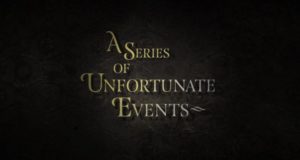
Released on January 13th, A Series of Unfortunate Events is a Netflix original based upon the books of the same name by Lemony Snicket (the nom deplume of Daniel Handler). The first season consists of eight episodes and covers the first four novels: The Bad Beginning, The Reptile Room, The Wide Window, and The Miserable Mill. A second season of ten episodes that will cover books five through nine — The Austere Academy through The Carnivorous Carnival — has already been confirmed, and a third is planned to cover the final four in the series, from The Slippery Slope to The End.
And how did it turn out?
*drum roll*
Very nicely, it turns out. I’m very relieved by this. I was worried that it wouldn’t quite be the ‘definitive adaptation’ that it had the clear opportunity to become, and while it isn’t perfect — what is, really? — it’s still a very faithful take that does its darnedest to capture what makes its source material special. It doesn’t always succeed at doing so, but it comes pretty close, and that’s about all you can ask for.
A Segue into a Rather Pointless Consideration of Adaptational Storytelling, Which You Are Free to Skip
I had a realization of sorts halfway through the season, and it’s one that made me a lot more lenient towards the liberties taken by the script. It was this: that A Series of Unfortunate Events, to some degree, is one of those works that really can’t be properly re-imagined outside of its home medium. Like A Song of Ice and Fire, Snicket’s series is too reliant on the particular strengths of printed storytelling to make the leap to a screen fully intact.
Whereas A Song of Ice and Fire’s issue mostly boils down to the fact that it takes advantage of books’ free reign with length and depth, A Series of Unfortunate Events’ shtick is its poking fun of the limitations and conventions of them. I mentioned in my earlier review that it’s one big love letter to the craft of storytelling, and it is — but to how it functions (for good or ill) on paper, specifically. And Netflix’s series makes that even more obvious when used as a comparison.
See, a large part of the novels’ charm is Snicket’s writing and how it subverts what you usually expect from an author. He ignores the expected transparency of a nameless voice simply relaying events to us and instead makes himself an unavoidable force in the narrative, constantly breaking the fourth wall and interrupting things as a main character in his own right.
As a result, when you take that gimmick and try to recreate it in a medium reliant on visual and auditory cues instead, it just isn’t the same. The series makes an admirable attempt at it, but you’re ultimately getting only a take/interpretation of the style, not the actual style itself. Not because the creators didn’t try hard enough, but because it’s a loss inherent to how different the two forms of media are.
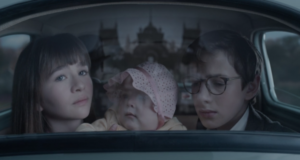
All of this to say that the series is weird. Which is a ludicrous thing for me to say at all, because I eat this oddball style up. I’ve sat through Ryan Murphy’s shows and have even almost enjoyed them at times, for heaven’s sake. And seeing as how I’m also very familiar and appreciative of the books’ unique charms, you’d think that I would have been able to jump right in. Instead, it wasn’t until The Reptile Room that things managed to click.
I think the problem (if that’s what you want to call it) is in the fact that the series isn’t an isolated work: it’s a weird show being combined with weird books, a weird childhood movie, and an idealized (but still weird) version that you envision for yourself while reading said books. Watching the show means that all of those things are being wrapped up into one confusing mass of expectations and comparisons. It isn’t fair to this new vision, I suppose, but it’s inevitable.
Once you get past the awkward honeymoon phase, though, it all falls into place. And even if you ignore the source material, you still have what amounts to a very bizarre show that is simultaneously very serious and very, well, not. It isn’t often that you find a series that ruminates on the nature of mortality and child mistreatment while also using pasta machines, zombie flicks, leeches, and hypnotism as significant plot points. But that’s exactly what the books did, and the closer adherence to them is noticeable right from the get-go, as are the unique characteristics that look to define the series as a whole going forward. Let’s break them down.
Spoilers begin here. Feel free to skip to the ending summary (Final Thoughts), if you’d like to avoid them.
****
~PRINCIPAL PROSPECTUS~
The Story
First, the big question: how does the plot hold up?
To which I answer a second time: Very nicely. Handler himself is an executive producer and wrote several of the episodes, so this isn’t too surprising, but it’s still a pleasant surprise. In fact, it might be the most faithful book-to-film translation that I’ve seen in a long time, and consistently maintains a good equilibrium between dark humor and ham, bleakness and optimism. That juggling is key to the original series’ unique feel, and it’s handled really well now, give or take a few scenes that are sort of clunky due to an over-reliance on one or the other. Clearly, the writers have had a set plan in mind from the start, and they are doing their best to keep the pacing clear. Good news for those of us who want to see all thirteen books eventually included.
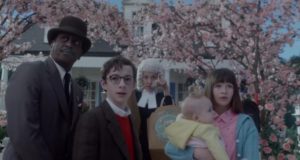
Sure, I’m willing to stick with these people for another eighteen episodes.
The season is actually very orderly about the formatting, too: each installment gets exactly two episodes, and each episode outright includes a title card with [Book Name – Part 1/2] at their start. I think that it’s safe to say that we’ll be avoiding most of the issues that come from trying to cram a long book into a short running time (say, the Harry Potter films) or a very long book into a long-but-not-long-enough running time (Game of Thrones). Of course, it also helps that, unlike that last one, this book series is actually finished, so the production doesn’t have to worry about surpassing their source material and having to wing it once they have.
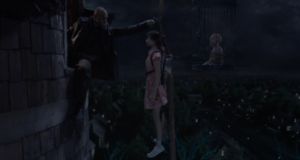
Not that their doing so would have been any less strange.
I was initially worried that two episodes weren’t going to be enough to adequately cover each novel, but it turns out that the format is just about perfect. With each being between forty minutes to an hour, the show manages to include every important detail from the book in a ninety-minute block with plenty of room to spare, which lets it throw in its own ideas without taking precious time away from crucial scenes.
It isn’t particularly noticeable with the two parts of The Bad Beginning, but the subsequent episodes actually feel a bit padded out in order to fit the duology format. However, this isn’t a bad thing at all, and I imagine that it’s only noticeable if you’ve done the reading beforehand. If anything, it gives the plot a chance to breathe a bit and spend some time better explaining and showing various story developments and characters, rather than barreling through them and/or leaving them implied like the books (and movie, since it crammed the first three together) do. It’s never so bad that it feels like filler, and your attention isn’t really left to wander while you wait for something to happen.
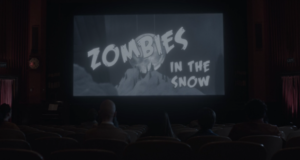
And if what is happening somehow manages to bore you, there’s always the reliable story-within-a-story (-within-a-story) trick.
So, for the most part, nothing from the books is kept out of the series. The majority of the changes made come in the form of either tweaking what’s there or (especially) adding to it. Generally, this works out well, though it does leave me with some concerns.
First, the tweaks. Most of these are done to better streamline the plotting for the format, and they’re minor enough that they really don’t seem detrimental. Eleanora Poe, for instance, is now Arthur’s wife, rather than sister, which makes it easier for her character to be included. In the books, she’s never actually met, and her impact on the story (namely, her bad reporting helping Olaf get away with his schemes while tarnishing the Baudelaires’ reputations) doesn’t become important until about halfway through the series. Here, it allows a one-off character (Poe’s wife) and a notable but ultimately sidelined one (Eleanora) to both be given a more upfront role that ties into the overall narrative sooner.
This actually nicely mirrors the effect that most of the additions have as well, and best represents the biggest concern I have for the show (which I’ll get to in a minute). Like with Eleanora, the new stuff is there to better organize and clarify the murkier bits of worldbuilding from the books, bringing them into the spotlight and revealing their existence much earlier, or at least giving them more obvious foreshadowing. Expect a handful of smaller nods to future elements — included not for any particular reason, so far as I can tell, aside from giving those who’ve read ahead a sly acknowledgement of what to expect down the road — as well.
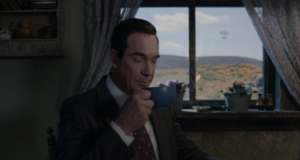
Like a certain handyman’s self-sustaining hot-air mobile home.
The most blatant example is a new character by the name of Jacqueline: a V.F.D. member who tails the orphans from one guardian to the next in an effort to keep them safe. She shows up early to work with Monty’s original assistant Gustav (who has gone from an unimportant older gentleman to a rather attractive fellow who is also a part of the group) and keep the Baudelaires from Olaf’s clutches. At this point, it isn’t clear if she’s an entirely new creation or an existing one that’s being introduced differently. My working theory is that she’s Kit Snicket under an alias, but she sort of disappears during the second half of the season, so we’ll have to wait and see.
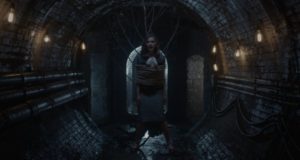
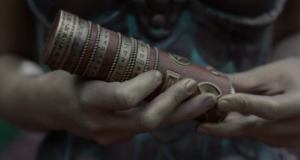
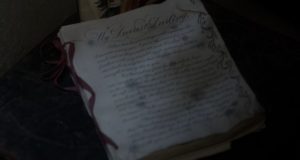
It may not look like it, but there is so much additional context being flaunted here. I’m disgusted, really.
Through Jacqueline and other scraps of narrative (Lemony’s scenes, usually), the existence of V.F.D., its connections with the Baudelaire parents, and many of its other mysteries are all made pretty clear from the onset, even borrowing elements from the companion books (The Beatrice Letters and Lemony Snicket: The Unauthorized Autobiography) that retrospectively filled in holes to draw connections right away. Interestingly, while the series makes fun of the movie a few times (including a straight-up hilarious fourth-wall break during The Reptile Room), it actually borrows a couple of things from it, with Klaus finding a spyglass in the ruins of the family mansion being the most notable. Like in the film, it gives the story an excuse to explore V.F.D. long before it’s explicitly mentioned in the novels, although there are plenty of other elements — shots of an underground network linking the mansion to names and places from future books are shown at the end of the pilot, for instance — that also do the job just as well.
(The other element from the movie is the idea that the Baudelaire fire was started using focused light, though unlike that adaptation, the show doesn’t outright imply that Olaf was the one who did it — something that the final book refuted, anyway. Both are curious additions, though, considering Handler’s distaste for the film.)
Is this a good or a bad thing? I can’t decide. It probably boils down to how well you liked the conclusion of the original series, and whether ‘the point’ that Snicket tries to make with it was fitting or not. (I won’t go into all of that again, but you can find my thoughts on the matter near the bottom of my review here.)
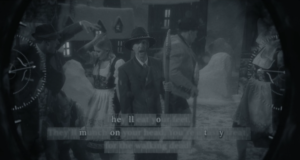
Oh no! Clearly understood plot points!
But, to summarize: I liked the way that The End framed the series as a whole and explained its lack of resolution and answers. The Baudelaires’ story is one small part of a much larger whole, and one that’s only tangential to their own tale in the first place — hence why it takes until the final pages of the fifth book (the second-season premiere here) for the broader storylines to even be brought up. It’s why the first half or so of the books was more emphatic on contained, repetitive plots and saved the bigger continuities until the second: because, as Snicket explains come book thirteen, the V.F.D. mystery — like life in general — is too grand and complex to be entirely understood or explained via any one person’s limited viewpoint. Reality doesn’t have easy answers or neat summaries, so why should fiction? I thought the idea was a remarkably ambitious one for Snicket to include in a children’s series of all places, and it helped explain the episodic feel of the first few books, when the focus stayed on the Baudelaires making the best of whoever’s guardianship they landed in that week. Ultimately, this wasn’t a story about secret organizations and past grudges, but one about three children and their ability to survive the world through their own wits and faith in one another. The rest of it was secondary, and so the author treated it as such to the very end.
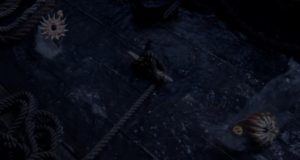
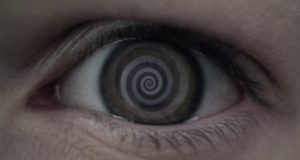
Because the primary plot was just too uneventful on its own.
To me, the approach also made the gradual unfolding of the V.F.D. mythos a lot more satisfying. Being spoon-fed details in bits and pieces over thirteen books with no clear reveals or connections being made forced readers to puzzle it out for themselves and create their own theories. The initial four didn’t even hint at a larger plot in the first place, which made the dramatic shift in focus during the later installments a great surprise. As a result, an actual insights were very exciting to find no matter how small they were, and plenty of opportunity was for personal interpretation. Frustrating, maybe, but rewarding in its own way. And long-lasting mysteries always tend to be have disappointing answers in the end when given so much buildup, so leaving them vague let the mystery and grandeur of the unknown remain.
Here, however, that’s all thrown out for the sake of easy, orderly explanations. I understand the need to include greater tie-ins and better organization from the get-go in order to establish some continuity and keep viewers invested, but, to me, it causes the mystery element of the story to lose a lot of its excitement and distract from the Baudelaires, who should remain the focus. It also makes me worry that, come the final few episodes of the last season, we’re going to get answers to the big questions that were never explained in the books — the sugar bowl has already been referenced, for instance, so it’s clear that they’re planned elements, at least. While I understand why that may be cause for excitement for some, it personally seems like it would take away a lot of the unique power of Snicket’s original ending. I honestly don’t think that I want to know who started the Baudelaire fire, or what the Great Unknown is, or what’s inside the Vessel for Disaccharides, but I know that plenty of you do, and I respect that.
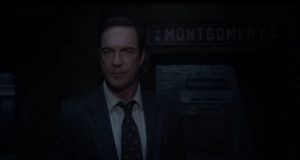
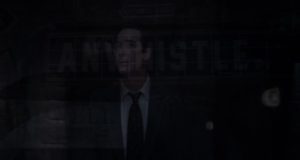
These two screenshots of one Snicket provide more straightforward explanation than anything the other one did in thirteen-plus books.
Anyway, we have a couple of years to wait before we get to see how everything pans out, so there isn’t much point in worrying over it. Before we move on, though, let’s look at one other notable addition: a subplot involving Cobie Smulders and Will Arnett as ‘Mother’ and ‘Father.’ Shown at the very end of the pilot, we spend most of the season watching the pair — clearly agents of V.F.D. — desperately trying to get home ‘to the children’ after a mission in another country goes awry. The whole thing is framed very obviously to make it seem as though the Baudelaire parents did, in fact, survive the fire that destroyed their home. The penultimate episode of the season, however, reveals that they are in fact the Quagmire parents, and that ‘the children’ are the triplets Isadora, Quigley, and Duncan. The whole story therefore ends up as a sort of prequel/visualization of something that was originally only mentioned by the Quagmires once they befriend the Baudelaires during The Austere Academy: the destruction of the Quagmire mansion and the loss of their own parents to a fire.
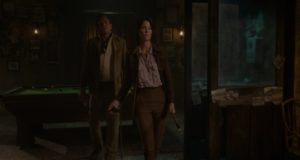
Not pictured: the alpaca that’s about to watch these two grievously injure several people off-screen.
I’m sort of torn on this inclusion. On the one hand, it’s not precisely ‘different’ from the books, as it’s just digging deeper into something that was already there but otherwise left more open. It’s also a smart move from a dramatic perspective: the parallels between the two families are very obvious already, so why not use them to throw in a neat twist at the end of the season? And since we’re only a third of the way through the books, there isn’t much canon opportunity to conclude this batch of episodes with a properly exciting finale, so it provides a decent emotional punch at the right moment.
On the other, though, it’s a pretty obvious reveal if you’re familiar with the plot already, as you’re likely to find it very hard to believe that the show is going to deviate so far from their source that it’s going to keep the Baudelaire parents alive. In which case, you end up spending the whole season being strung along somewhat pointlessly, especially since once the twist is pulled, the fire that you can consequently expect arrives about two minutes later. Spending the whole season watching these characters struggle towards their goal and make grandiose plans to ‘tell the children everything’ seems rather wasteful when they’re promptly killed off the moment that goal is reached.
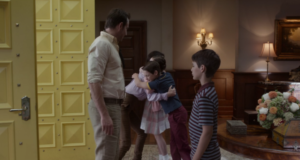
‘Surprise! We’re about to die.’
Still, it’s a very clever utilization of something very minor in the books that doesn’t change (or ‘ruin’) any of the material in the process, so I give the writers plaudits. Will we get something similar next season, I wonder? (And who was the figure we see starting the fire in the first place? Esmé, perhaps?)
The Characters
In general, the casting is spot-on so far as the choice of actors and how they’re written is concerned. Again, some of them take a bit of getting used to if you’re familiar with the film, but they settle into the roles quickly.
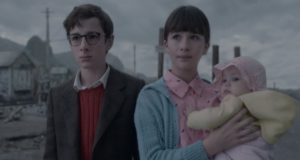
Violet, Klaus, and Sunny — played by newcomers Malina Weissman, Louis Hynes, and Presley Smith — are kept firmly intact, and the show avoids some of the more unfortunate (ha-ha) changes that the movie made, such as giving several of Violet’s achievements to Klaus to make him the more action-oriented lead. Instead, each of the three gets time to shine, be it to showcase their cleverness and problem-solving or their more emotional and vulnerable moments. There’s even some extra bits thrown in to give them all more to do. Sunny, for instance, proves herself a very capable poker player here, and considering that her characterization really didn’t shine until the latter half of the series once her cooking skills became a plot point, it’s a nice addition. In general, all three get to show their range as characters and as actors, sometimes showing themselves remarkably mature and sophisticated thinkers and sometimes simply being frightened children who don’t have all of the answers.
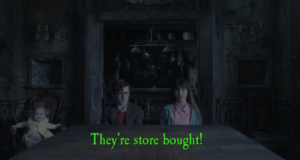
This makes sense in context.
Their acting (or, in Sunny’s case, the babbling and subtitles, provided by Tara Strong of all people) is quite good, too, considering how young the performers are. (Bonus points to the casting directors for actually choosing kids to play the parts.)
Meanwhile, Neil Patrick Harris as Olaf is still a direction that I’m a bit thrown by. He definitely gives it his all, but something about Harris just doesn’t click for me. He’s simply too theatrical and ‘light’ in voice and mannerisms to completely nail the (admittedly somewhat ridiculous) menace of the character.
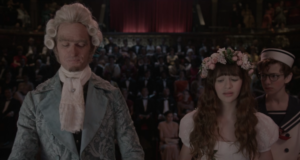
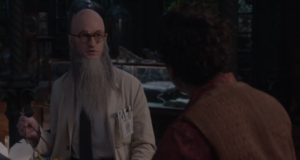
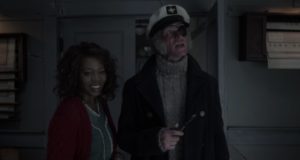
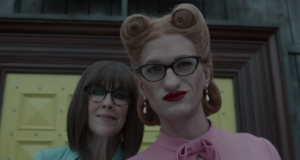
Acting!
Ultimately, though, he does a very good job at balancing the comedy and genuine menace of the character, and his turns in his various disguises are consistently solid at being appropriately funny or threatening. Like the series in general, there’s an adjustment period to his role, but after a few episodes, it solidifies into something worthwhile.
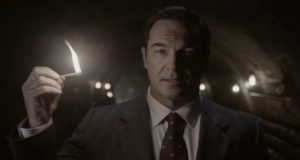
Finally, Patrick Warburton as Lemony Snicket was another casting decision that I wasn’t sure of, but he sells it. The deadpan narration and quips work very well with his distinctive sound, and conveys the dry humor and wit of the books very nicely.
And though the main cast is consistently good, the supporting players tend to be the real MVPs whenever they appear:
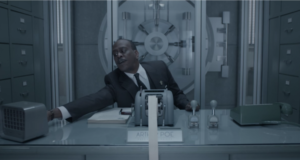
Todd Freeman’s Arthur Poe is more high-strung than you might expect, and some of the comedic bits that come with his bumbling (especially his constant coughing) get a bit grating (or are just confusing, like an extended scene of him sampling clam chowder on Damocles Dock), but he makes the character’s ineptitude much more charming (and perhaps more forgivable) than his original incarnation.
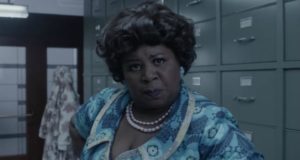
On a related note: Time will tell how Cleo King’s Eleanora Poe works into the scheme of things as the story goes, but I get the feeling she’ll become fairly important in subsequent seasons — even more so than she was in the books, even, seeing as how her less-than-stellar reporting is already being used as an ongoing gag.
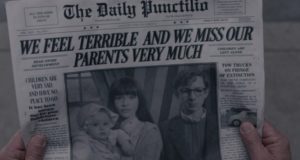
Comedy gold.
The various guardians (or guardians-by-proxy) are all memorable despite only getting a couple of episodes, and the roles give some actors a chance to have some fun without completely overriding the characters with their being, well, celebrities.
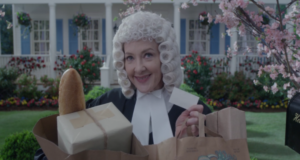
Joan Cusack’s Justice Strauss is a bit loopier (in a kindly, she-means-well-even-when-she’s-sort-of-awkward-to-be-around sort of way) than the judge’s previous portrayals, but she’s absolutely endearing because of it.
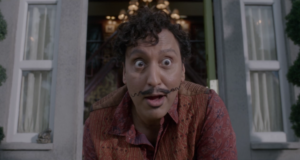
Aasif Mandvi’s Uncle Monty is also a bit over-the-top in his enthusiasm (a boisterous, boyish sort of niceness in place of the gentler, grandfatherly feel that he gives off in the books), yet is too friendly to dislike.
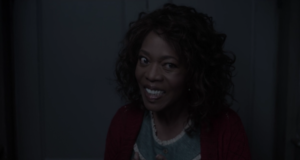
Alfre Woodard’s Aunt Josephine is probably my favorite of the bunch, as she not only pegs the irrational fear and paranoia, but also gets some underlying resolve to round her out better.
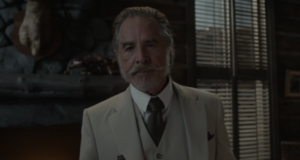
Don Johnson’s Sir is probably the only one that I’m not entirely happy with, but that’s mostly because they took away the character’s most notable feature — namely, his lack of a concrete appearance due to an omnipresent cloud of smoke hanging around his head — which leaves him as a rather simplistic, ‘all-work-no-play’ type of villain that isn’t nearly as fun as he could have been.
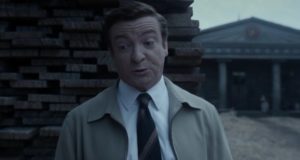
Another aside: I sort of appreciate the show making his relationship with Charles — who is played very well by a kindly-but-timid Rhys Darby — as a bona-fide couple explicit, as it was something seemingly implied in the books, but the skewed nature of their roles as a couple and the way they’re gendered doesn’t thrill me. Charles is the weakly, domestic ‘housewife’ and Sir is the gruff, take-charge head who’s a borderline tyrant with him. It’s just uncomfortable to watch.
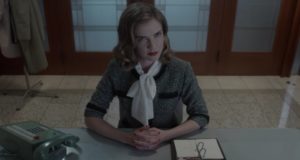
Sara Canning as Jacqueline has a great steeliness and determination that reminds me of Peggy Carter from the Marvel films, and her wryness fits the overall tone well despite her (potentially) being a new character. She sort of disappears during the latter half of the season, but I’m sure that she’ll be back.
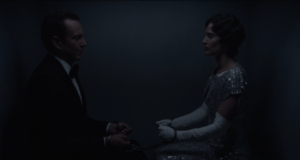
Similarly, Cobie Smulders and Will Arnett’s Mother and Father are fun with their serious-but-not-really spy spoofs (a persona that they both excel at, of course, since they’ve dabbled in similar characters before). It’s a shame that we (probably) won’t be getting more of them.
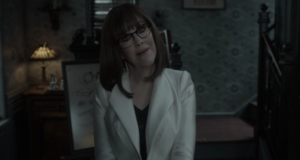
Catherine O’Hara, who previously played Justice Strauss in the 2004 film, shows up again, though this time as Georgina Orwell, who’s given a notably expanded backstory as Olaf’s ex-girlfriend and former secret-organization member. She still manages to hit the right medium between scarily intense and laughably wacky, though, and it’s a treat watching her and Harris ham it up throughout the final two episodes.
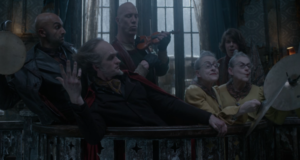
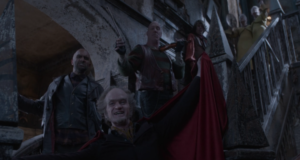
There is definitely singing happening here.
Special mention goes to Olaf’s troupe of henchman, who consistently provide the funniest bits of dialogue and visual comedy.
Usman Ally’s Hook-Handed Man gets a fairly large role, which hopefully hints of him retaining his greater importance in the final novels; Matty Cardarople’s Person Who Looks Like Neither a Man Nor a Woman gets the best lines, delivering moralistic and social commentary in a hilariously mumbling monotone that makes it clear that they’re probably the smartest person involved in all of this; and Jacqueline and Joyce Robbins’ White-Faced Women get a good share of rapid-fire dialogue with one another. (John DeSantis as the Bald Man does a serviceable job, too, but he doesn’t get much to do.)
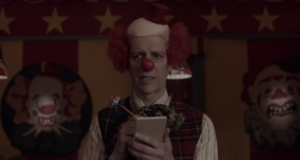
If you ignore the fact that his life is actively being threatened right now, this scene is hilarious.
My favorite of the bunch, however, is Patrick Breen as Larry: the (only) employee at the Anxious Clown restaurant. Like a lot of other elements, his role is much expanded from the books, making it clear from the start that he’s a V.F.D. agent working undercover. My misgivings with that can of worms aside, makes the most of his few scenes and probably made me laugh more than I did at any other episode.
The Style
Setting
Before we wrap everything up, I’d be remiss if I didn’t mention the overall look and feel of the series. With Barry Sonnenfeld involved (look out for an obligatory Men in Black reference), I was sort of hoping that the costume and set design would be similar to that of another show that he was a part of, and one that I hold very dear: Pushing Daisies. Sure enough, the overall effect is a very similar one, so if you enjoyed that series’ panache, you’ll get a kick out the visuals here.
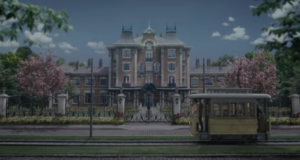
I admittedly have a thing for pastels.
So the look is fairytale-meets-throwback-period-piece: a vibe that reminds me of Tim Burton’s earlier work, particularly with Edward Scissorhands. That means timeless-feeling locales with no particular grounding that are filled with contrasting candy-coated brightness and dull, dark griminess. It’s not only an excellent realization of the books’ style, but also suspends the story in a sort of limbo that lets it get away with its more ridiculous developments — since everything about the story already looks and feels surreal, just about anything can believably happen within it.
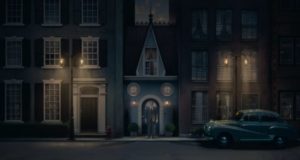

…and houses that look like Wes Anderson dioramas.
(Although it also has the unfortunate effect of making any attempt at a ‘current’ reference — such as Olaf suggesting that something be looked up on the Internet or Sunny suggesting the kids hire Uber — feel very out of place. Seeing as nobody appears to own any sort of electronic device or a car that was made in the last twenty years, these moments really don’t fit at all.)
Also much like Pushing Daisies is an extensive use of background CGI in order to render these pretty settings, and it’s obvious. Similar to that other show, though, it sort of enhances the dreamlike feel of the locations rather than distract from them, so the reliance ultimately works in the visuals’ favor.
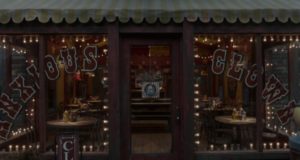
Ridiculous theme restaurants also included. Be on the lookout for the Café Salmonella next season.
Effects
Some of the more explicit special effects don’t work quite as well as the above, admittedly, but it seems clear that the show did the best it could with its limited budget. Seeing as how even big-money items like Game of Thrones can’t afford high-end CGI all of the time and how extensively it had to be used here, I think they did an admirable job. It’s mostly only noticeable with the smaller things, anyway. The big set pieces, like Josephine’s house crumbling into the sea, are beautifully done, as are certain full-body creations like the Incredibly Deadly Viper and Sunny during her (admittedly jarring) action moments.
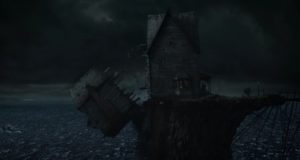
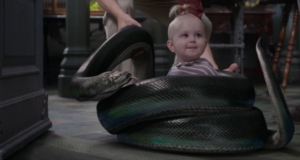
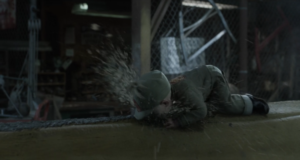
Good stuff. Though the computer-generated toddler is sort of unnerving.
They just about rival the 2004 film in realism, which is impressive, even if that movie did come out over a decade ago (God, I’m old). So when you’re suddenly presented with a noticeably fake-looking crocodile or airplane, it throws you, but not as much as it might have.
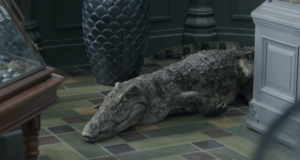
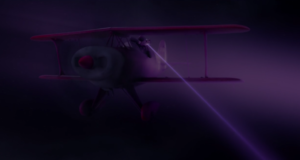
It’s just very silly. But in a good way.
(Shout-out also to the very obvious Sunny stand-in doll that the older children run around with at various points. You’d think they could have found something a bit less…stiff, especially if they could afford to make her shuffle cards and saw through a log with her teeth without it looking completely ridiculous.)
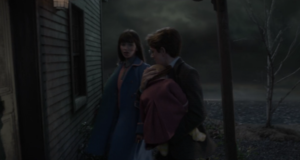
I’m at least 67% certain that that isn’t a real infant.
Narration
Narrative-wise, the show’s most notable feature is the method it uses to translate Snicket’s various asides, commentary, and overall style. Despite the original writing’s quirks being largely dependent on the printed format, the creators managed to do a beautiful job replicating it about as faithfully as they could here, even going so far as to explicitly use some of them word-for-word (such as the repeating of ‘He found himself reading the same sentence over and over’ and an explanation of the phrase ‘Meanwhile, back at the ranch’). Warburton’s character gets to be as omnipotent and omnipresent as he was in the source material, but this time he plays on the visual element of the series to make use of its strengths instead. Rather than using the typical voice-over (as the film did), he instead appears and vanishes among the on-screen characters (who usually don’t acknowledge his presence) and settings at frequent intervals to talk directly to the viewer, sometimes pausing the action in the process.
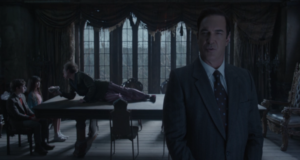
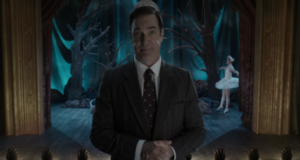
I hope that you find Patrick Warburton’s voice soothing, because you’re going to be hearing it a lot.
These moments can be as simple as him delivering a monologue in the middle of a sequence before he lets it resume, or as elaborate as the camera shifting to an entirely new set designed specifically for Snicket to discuss — or even manipulate — the story. Frequently in costume to match the context that he’s walked into, we get to see him casually stand among a mansion as it catches fire, rewind a sequence to show it again from a different perspective, play the weatherman in a surreal little news station broadcast, walk among props illustrating the points that he’s making in the middle of a wood, and purposefully shift the palette into black and white (because, as he tells us, it’s ideal for flashbacks). And in an additional nod to the books’ meta-plot, we even get some notable references to his own past (a significant element of his narration), including his relationship with Beatrice.
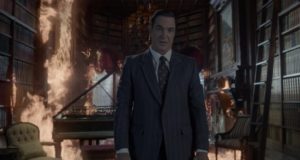
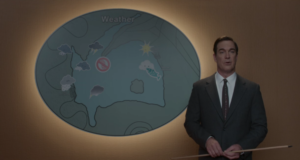
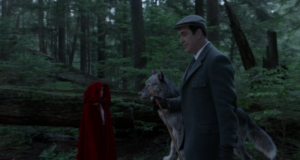
On a completely unrelated note, let’s play a game called How Many Times Did the Producers Slip ‘V.F.D.’ On-Screen and/or Into the Dialogue? Also available is How Many Times Does It Appear in This Review, Specifically? The answer may surprise you.
As a whole, the approach is very well done, utilized frequently enough to capture the books’ particular charm (and throw in some additional visual flair to boot), but not so often that it distracts from the children’s narrative or gets tiresome.
Music
Not much to say here, as it’s nothing particularly different from what you’d expect. I’m very happy to see that James Newton Howard was brought in to handle the soundtrack, though. He’s one of my favorite composers, and likely the one who has the best chance of living up to Thomas Newman’s 2004 film score, which I adore.
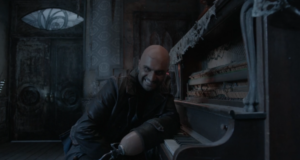
Note: This isn’t James Newton Howard.
Nothing here is quite as memorable, but that’s likely multiple viewings of and nostalgia for the movie talking. Still, it’s appropriately quirky and dark, and we even get a few musical numbers thrown in for good measure, including an ensemble song to close out the season.
Title Sequence
Lastly, let’s take a quick look at the opening title sequence, which is always an important element of any television series, given that we’re going to be seeing it many times before we’re done.
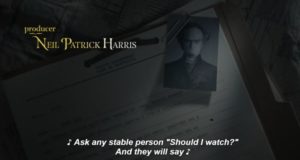
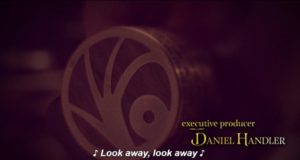
It will get stuck in your head. It’s in mine right now.
A Series of Unfortunate Events’ opening isn’t quite as stylish as I hoped it would be (I’m admittedly partial to high-concept, minimalistic ones — see Westworld or Hannibal), but it’s appropriate: over a droning, slightly annoying original song warning you to ‘look away’ from the screen so as not to see the terrible things about to happen (Handler wrote it, so it was inevitable that we were going to get a hearty dose of downer meta), a lengthy mix of new and episode-drawn shots are shown in sepia, along with some Baroque-styled text and title cards. The visuals and song’s lyrics actually change during the latter half of the sequence every two episodes in order to fit whichever book is being covered, which is a nice touch.
Another inclusion that fans of the novels should appreciate: each ‘Part One,’ in addition to starting with the series’ and episode’s usual titles, also introduces the next installment with its corresponding dedication to Beatrice. It’s the little details that make adaptations worthwhile.
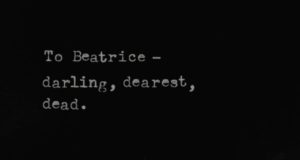
They’re all this feel-good, too.
****
~EPISODIC ESSENTIALS~
Now that we’ve covered the season as a whole, let’s finish up with a brief rating and some miscellaneous thoughts for each ‘chapter.’ Since they’re all two-parters, we’ll keep them together to consider them as a whole:
Episodes #1 / #2
‘The Bad Beginning’
★★★★☆
♪ The children lose their home and go to live with someone awful
He tries to steal their fortune with a plot that’s not quite lawful
It’s hard to fathom how the orphans manage to live through it
But how a decent person like yourself would even want to view it ♪
It’s hard for me to critique this one, namely because, as mentioned above, it took the first few episodes to adjust to the show’s particular style and take on the source material. My first instinct was ‘I don’t like this. This is strange, and not in a good way.’ Harris’s Olaf is in full force from the onset, so you’re hit with his theatrics very quickly (singing included), and alongside the general wackiness of everyone else (Strauss, the Poes, et cetera) and the immediate inclusion of new material (Jacqueline and V.F.D., Mother and Father), it’s a lot to swallow so early, even if you have some idea of what to expect. A day or two after watching the season, however, my opinion improved once I had some time to think things over within the context of all eight episodes, so I’m a lot more favorable than I initially was.
Taking hindsight into consideration, then: it’s sets up the rest of the season’s close take on the books and does a solid job at setting things up, whether it’s for future storylines (the sugar bowl, Strauss’s later involvement) or recurring elements like the V.F.D. mystery. The settings are pitch-perfect, including Olaf’s run-down mansion and Strauss’s idyllic next-door cottage, and the plot hits the right notes with both the drama (Olaf’s slapping Klauss is as unsettling to watch as it is to read) and the humor. Having Sunny’s rescue attempt and Violet’s method of stopping her marriage to Olaf given the proper recreation is also a bonus.
Episodes #3 / #4
‘The Reptile Room’
★★★★★
♪ The Baudelaires are living with a man who studies snakes
He’s jolly and he’s secretive and makes a few mistakes
Spoiler alert — a villain comes to steal and murder
And so if I were you, I wouldn’t even watch one minute further ♪
Things really start to come together nicely once the Baudelaires are sent down Lousy Lane. Montgomery’s home is ridiculously elaborate and beautifully recreated, and the notable amount of CGI used for the various oddities in his collection is handled well. It’s probably the funniest portion of the season, largely because Harris’s Olaf-as-Stefano disguise and the Person Who Looks Like Neither a Man Nor a Woman’s nurse persona. The plot is probably stretched to fit the running time most notably here, but not in a way that feels forced, uninteresting, or ultimately off from the original material. Rather, it’s more of a flushing out of brief developments to make for a more detailed version of the story.
Of special note is a segment where the children go to a movie — kept very short in the book and seemingly insignificant, it’s made a rather large part of the plot here, and actually incorporates something that was only revealed in the Unauthorized Autobiography companion novel. Yes, Monty’s being contacted by V.F.D. via secret code and instructed to leave for Peru is made explicit here, and it’s a thoughtful inclusion on the part of the writers as a means of ordering the storyline more neatly. (And, aside from my running concern regarding the greater clarity taking away from the mystery of the series, it’s fun to actually see a bit of Zombies in the Snow. Considering how accurate it manages to be to the dialogue mentioned in the Autobiography, too, it’s clear that the writers did their homework.)
Episodes #5 / #6
‘The Wide Window’
★★★★★
♪ The Baudelaires’ new guardian is wracked with fear and panic
They end upon a boat that might as well be the Titanic
We polled a bunch of adults — 99% agree
There must be something happier on screen for you to see ♪
My favorite part of the season. This book probably gets the most accurate adaptation of the four, which is certainly a plus, but it’s by no means the only reason why these episodes are great — they’re also visually stunning and very funny. Lake Lachrymose, the town, the Anxious Clown, and Josephine’s precariously-perched home are all perfectly realized and generally gorgeous as background settings, and while these locations may also very well use the most CGI, just about all of it is excellent. As mentioned already, the collapse of Josephine’s house off of the cliff is especially impressive: not quite as elaborate as the film’s version was, but just as over-the-top (this take involves wind somehow supporting half of a collapsing building — several times) and giddy. The Baudelaires’ seafaring journey to Curdled Cave and back is surprisingly well done as well despite the obvious limitations to the show’s visuals, though a new scene in which Mother and Father inadvertently help the children find rescue while flying overhead in an airplane is probably the most ludicrous thing that this or any version of the plot has done. It arguably helps makes Violet’s plan more believably successful than it was in the book, but it’s such a weirdly done bit that, coupled with some pretty bad special effects and notable discontinuity (the lighthouse can’t decide whether it’s actually there or not, and is clearly positioned in the opposite direction from where it’s repeatedly shown on various maps), it just feels like one Big-Lipped Alligator Moment, which you would think that a series like this wouldn’t be able to actually have. (In retrospect, though, I find it sort of endearing.)
The dinner segment with Larry is also so good that it was the moment where I decided that I liked the series as much as I do. It’s one of those moments where several of the show’s strengths — the quirky visuals, Snicket’s monologues, the henchmen’s banter, the faithfulness to the source material — all come together in harmony to a make a memorable sequence that isn’t particularly ‘big’ but nonetheless feels exciting. Really, this chapter is just a good piece of television in general, and really drives home the unique look and feel of Snicket’s work. For this kind of adaptation, that’s about the best you can hope for.
Episodes #7 / #8
‘The Miserable Mill’
★★★★☆
♪ The lumber mill is where the Baudelaires are forced to work
The eye doctor is sinister; the owner is a jerk
They end up in a fiendish plot with logs and hypnotism
The very though of watching should be met with skepticism ♪
Because it plays with the source material the most of the four installments, the final two episodes end the season on a note similar to the one that the original pair began it with: somewhat shakily. Again, though, some thought has left me a lot more favorable to the closing chapter than I was initially. The transition from Lake Lachrymose to Lucky Smells is handled differently (the orphans hitch a ride on a conveniently departing work truck to investigate the locale on their own and are shanghaied into working there, rather than being sent there specifically by Poe to live under Sir’s guardianship), and the story generally adds enough to mark a notable deviation from the book. Sir and Orwell are given expanded backstories, and a subplot involving the Baudelaire parents being responsible for the town’s burning down (in and of itself a different take on the setting) is slipped in as well. Most of the changes are just that, though: additions, rather than alterations, so they don’t change the plot significantly. (Though I am bummed that we didn’t get a dramatic recreation of Sunny and Orwell’s sword-on-tooth fight. That would have been interesting to see.)
It’s understandable, given that the season needed some form of closure despite being only a third or so through the larger plot, and so the greater continuity that had been sprinkled throughout from the start had to be reinforced. Given that the original novel is the last book in the series that’s almost entirely self-contained, it’s an interesting contrast once you get over the knee-jerk ‘They changed it, so it’s terrible’ reaction that’s always hard for readers to escape. Plus, it’s just fun to finally see something from the franchise beyond the first three works to finally get an on-screen adaptation, and one that’s — despite everything — pretty damned faithful nonetheless, especially when compared to most television or film translations.
The season ends, as previously mentioned, with a cast-wide musical number, which includes plenty of meta references and fourth-wall breaking. It feels like a tacked-on way to provide some kind of closure to the finale and avoid leaving things completely left open (ending poised as it does at the start of The Austere Academy), but having Patrick Warburton suddenly break into song while staring at the viewer for an extended period of time is the ridiculous sort of ending that I can get behind.
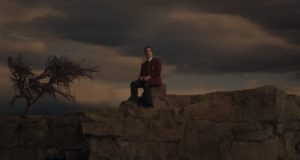
More (all?) stories should end with Patrick Warburton singing while maintaining direct eye contact with you.
And judging from the handful of details that we get to see already of Prufrock Preparatory as we head into book five, next season is poised to be just as solid as this one.
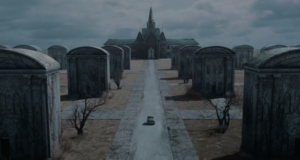
Expect mandatory violin recitals and orphans running laps. Also, this weird-looking school.
****
~CLOSING CONTEMPLATIONS~
Well, this review became way too long, just as my last one did. My apologies. I promise that I’m only this wordy when discussing things that I particularly enjoy, so take the length of this thing as my biggest compliment of the series.
As with the books that preceded them: five stars out of five.
It’s a big relief to know that this series is as good (and as faithful) as I had hoped it would be, so I’m happy to confirm that A Series of Unfortunate Events has finally gotten the adaptation that it deserves. We have two seasons and nine books to go, of course, so nothing is set in stone, but our first year has made it clear that we’re in good hands. Good enough hands, in fact, that I’m already itching to rewatch it, which is a fairly big indicator of my opinion of it. I’m rarely committed enough to stay on top of your typical weekly series, much less marathon multiple episodes at once. And I watch so little television in general (not because there isn’t anything good on, of course — I’m just lazy) that wanting to rewatch a full season beyond a random episode or two so soon after the first time through is something of an achievement.
So here’s to a great freshman year, and to what will hopefully be an equally great sophomore one. If you’re a fan of the books, you’ll definitely want to give this a go. If you read them but didn’t like how it structured or approached things, you’ll also want to give it a go, because there’s enough that’s different to correct most of those issues that you probably had. And if you’re just interested in some television that isn’t yet another medical/police drama or slice-of-life comedy (or just really want something offbeat), you’ll probably be interested. Just give it a few episodes — it’s weird, I know. But we need more media that tries something new and different, and it’s up to us to help those ideas succeed.
Until next time, folks. Thanks for persevering to the end.
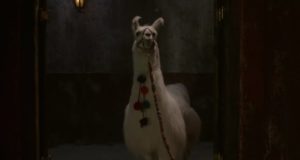
Oh, there’s the alpaca!
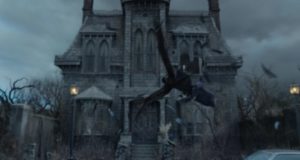
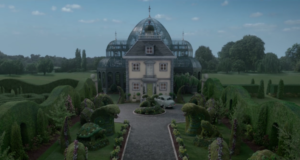
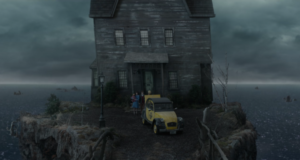
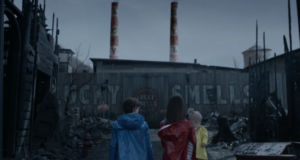


Marie
I’ve only watched the first two episodes, and I am having a hard time getting invested in it. I didn’t read the books growing up, I actually didn’t even know the books existed until that movie came out in ’04.
Is it worth sticking to? Do you think someone like me who hasn’t read the books when they were a kid will still enjoy the story?
Monteverdi
Good question. I would normally encourage you to stick with it, but I say that as someone who’s obviously fond of the source material already.
I suppose it would depend upon what does and does not work about the series for you. If the overall look/feel/style of it doesn’t click, it might not be worth continuing, since the show won’t be deviating from that anytime soon — the strangeness is going to only get more pronounced, if anything. If it’s the particular plot or cast of characters of those two episodes, though, I’d recommend giving another few episodes a try. Since each pair of them has a notably different setting and storyline, there’s a good chance you’ll like certain ones more than others, and the variety might be enough to keep you invested.
Sara
I read this whole post while bored at work today. Shhh don’t tell my boss! Anyway, YES TO EVERYTHING! I agree with you on everything you wrote! I LOVED this first season and I think it was done very, very well and feels very much like the books in TV form. It’s witty and dark and fun! I think Neil Patrick Harris took some getting used to, but by the third episode I was all in! I want more of this show stat!!!
~Sara
Carina Olsen
Lovely review Monteverdi 😀 Yaaay for enjoying this show so much. <3 Gah. I must watch it soon 🙂 You are making me so so curious. Thank you for sharing all of your awesome thoughts about it 🙂